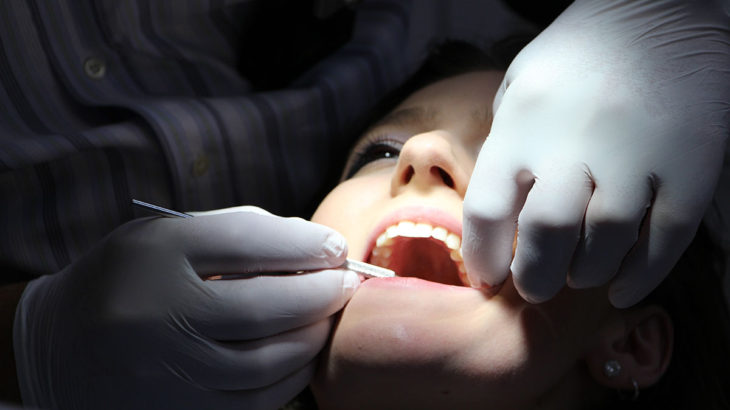Toothache is usually caused by bacterial infection, external trauma or a failed filling. Whatever the cause, pain in a tooth can be such a harrowing experience that finding relief takes priority over everything. Natural remedies and essential oils can cure dental cavities, gum inflammations and other dental problems. They are an effective and healthy alternative to conventional dentistry.
Toothache Causes

The bacterial infection behind dental cavities is often caused by a microbe called streptococcus mutans. Like all bacteria, the tooth-destroying variety also thrives on carbohydrates and sugars. It produces an acid which creates the hole that we call a cavity.
The bacteria inside a cavity then gets in touch with the sensitive tooth nerves, which, when inflamed, cause the tooth to ache. Left unchecked, the bacterial infection may lead to losing the tooth, or, if the bacteria from the tooth escapes into the bloodstream, to heart infection.
Gingivitis and periodontitis are also caused by bacteria. Gingivitis is a bacterial inflammation targeting gums. In this condition, the gums are swollen and bleed easily.
Tooth abscess, on the other hand, is a pocket of pus forming at the root of the tooth or between the gum and the tooth. It is caused by bacterial infection and results in pain, bad breath and fever. Often the pus has to be drained out by a dentist.
Essential Oils and Tooth Care

Conventional dentistry with its fillings, tooth extractions, and especially root canals, is destructive and may lead to serious chronic illnesses, such as arthritis and kidney disease.1
If you are lucky enough to have healthy teeth, it is strongly recommended that you commence a life-long natural tooth care program incorporating proper dental hygiene and a healthy diet. Use of essential oils is highly beneficial.
If you are suffering from an aching tooth, read on to find out how to treat toothache with essential oils and how to make it less likely through lifestyle changes that you will ever need to undergo invasive dental surgery again.
5 Essential Oils for Toothache and Dental Damage
1. Clove Bud Essential Oil
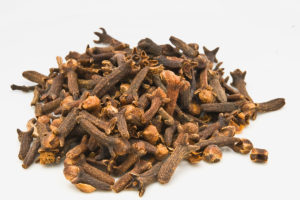
Clove Bud Essential Oil is well-known for being the go-to essential oil for toothache. It contains eugenol, a powerful antioxidant and an effective anti-inflammatory agent. Clove Bud Essential Oil is also antibacterial.
A 2006 study tested Clove Bud Essential Oil and benzocaine, a local anaesthetic, on 73 test subjects. The subjects were tested on their response to needle sticks. The study concluded that benzocaine and Clove Bud Essential Oil gels were both equally effective as painkillers.2
APPLICATION: Clove Bud Essential Oil is a strong disinfectant and numbs the pain in the tooth and the gum efficiently and quickly. Add Clove Bud Essential Oil to a cotton bud and apply directly on the tooth. If the cavity is large or the filling has fallen out, press the oil into the cavity. You can also add 2-3 drops of Clove Bud Essential Oil to warm water and use the liquid to rinse your mouth and gargle. To combat inflammation even more efficiently, add Peppermint Essential Oil to the mixture.
2. Peppermint Essential Oil
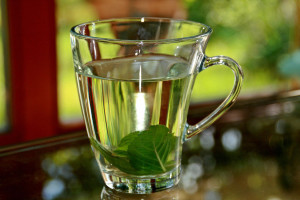
Peppermint Essential Oil is a mild anaesthetic, as well as being antiviral and antibacterial. It helps to kill dental bacteria and to reduce plaque. It is also an effective remedy for bad breath when combined with tea tree and lemon essential oils.
In a 2010 study, the researchers evaluated the efficacy of Peppermint Essential Oil against anaerobic bacteria within periodontal pockets and alveolar abscesses inside the mouth. Porphyromonas genus of bacteria were found to be the most susceptible to Peppermint Essential Oil—this is great news for people with periodontal disease, which is caused by porphyromonas gingivalis bacteria.3
Do not give undiluted Peppermint Essential Oil to children as it can temporarily halt their breathing with possible catastrophic results. To treat a child’s toothache with Peppermint Essential Oil, mix it with coconut oil in a 1 to 1 ratio and rub the mixture onto the child’s gum.
APPLICATION: To kill tooth pain, apply Peppermint Essential Oil undiluted on the tooth. Alternatively, add 2-3 drops of Peppermint Essential Oil into warm water or coconut oil and rinse your mouth thoroughly with the mixture.
3. Chamomile Essential Oil

German chamomile and Roman chamomile are gentle essential oils suitable to be used on children and infants. Chamomile is slightly sedative which means that it also helps with anxiety caused by the prospect of a visit to the dentist.
Chamomile Essential Oil contains the chemical compound chamazulene which makes it an excellent anti-inflammatory. It also has antibacterial properties.
A 2016 study tested the efficacy of different essential oils against porphyromonas gingivalis bacterium. At a 100% concentration, chamomile was the third most effective antimicrobial essential oil, after eucalyptus and tea tree essential oils.4
APPLICATION: Chamomile is a very good essential oil for treating children with teething pain or an adult with a dull toothache. To do this, prepare a hot compress by adding 1-2 drops of Chamomile Essential Oil into hot water. Dip a hand towel into the mixture, wring off the excess water and apply the compress on the outside of the cheek. Renew the compress when it cools down.
4. Tea Tree Essential Oil
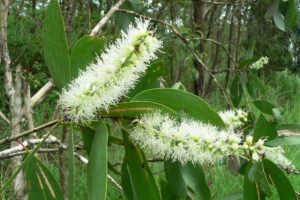
Tea Tree Essential Oil has been used by Australian Aborigines to treat wounds, cuts and infections for millennia.
Tea Tree Essential Oil is a mild anaesthetic, and can be used to dull a toothache. It also works against bacteria, viruses and fungi.
A 1994 study, published in the Oral Microbiology and Immunology Journal, stated that Tea Tree Essential Oil, along with sage and peppermint essential oils, was the most effective essential oil against oral bacteria.5
APPLICATION: To treat an acute inflammation of the tooth, add 1-2 drops of Tea Tree Essential Oil on a cotton bud and apply directly on the tooth. You can also use Tea Tree Essential Oil in a warm water gargle with peppermint and eucalyptus essential oils.
5. Lavender Essential Oil

Lavender is a familiar, all-purpose essential oil which helps to address dental damage as well as the anxieties and fears associated with it.
Lavender Essential Oil balances the nervous system, acting either as a stimulant or sedative, according to need. It has been used successfully in dentist’s waiting rooms to reduce the patient’s anxiety prior to their appointment, and its analgesic qualities can help with the pain of tooth inflammation.
Lavender Essential Oil reduces the amount of plaque on teeth. Along with clove, lavender also helps to minimise canker sores inside the mouth.
APPLICATION: To reduce toothache-related stress, add Lavender Essential Oil into a diffuser and breathe in the calming aroma. For uncomfortable canker sores, apply Lavender Essential Oil directly on the sores. For more precision and to save oil, use an eyedropper for application.
Toothache Prevention and Nutrition

Tooth diseases leading to expensive dental operations and unnecessary pain can be avoided by adhering to proper nutrition. The earlier bad eating habits are corrected, the better for your teeth.
There is strong evidence that suggests that modern diet causes cavities and other dental diseases. The American dentist Weston A. Price (1870-1940) studied isolated villages in the Lötschental region of Switzerland in the 1930s. Residents lived on locally produced food only. Their diet consisted of raw milk from cows and goats, cheese and butter, broth and meat, and local sourdough rye bread, called roggenbrot.
What Price discovered was that only 1% of children and adults in that area had tooth cavities. This was incredible, and in stark contrast with people in less isolated areas of Switzerland where 33% of the inhabitants had cavities.
The diet of these westernised citizens consisted of white flour, sweets, pastries and fruits, as well as butter, milk and eggs—which they ate in smaller amounts than their rural cousins.
Price concluded that to keep your teeth healthy, you must eat foods containing ample amounts of vitamins A, D, E and K2 (which had not been discovered at the time, and which Price called the ‘Activator X’.)
To get all the vitamins and minerals necessary for vibrant, healthy teeth and bones your diet should consist of plenty of raw milk and dairy products, grass-fed meat and seafood, such as shellfish, fish heads, clams and oysters. Fermented cod liver oil taken regularly helps to keep vitamin A and D levels high. It is also an invaluable source of Omega 3 fatty acids.
General Home Treatments
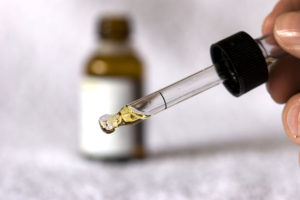
Home treatment of inflamed teeth and prevention of tooth decay are important. To rid yourself of the pain quickly, even if temporarily, apply 1-2 drops of undiluted Clove Bud Essential Oil directly on the tooth. You may also wish to gargle regularly with warm salt water. Vitamin C in large doses helps the body to defend itself against bacterial attacks and should be used in this case also.
Halitosis, or bad breath, may be caused by bad dental hygiene or the lack of vitamin B3. For a quick essential oil remedy, mix 4-5 drops of tea tree, clove or clary sage essential oils in warm water. Rinse your mouth thoroughly and spit the liquid away. Lemongrass and peppermint essential oils are also effective in getting rid of bad breath.
Herbs for Your Teeth
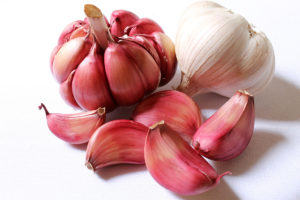
The key word in dental care is natural. If you are stranded at home with a toothache and nothing to alleviate the pain, look no farther than the common cooking ingredients garlic and turmeric.
Along with all the other health benefits, garlic is a wonderful remedy for toothache. It is full of antibiotics and antibacterial substances. Chewing on a raw garlic clove will give you instant relief for tooth pain.
The common food spice turmeric is antibacterial and anti-inflammatory. It will prevent cavities as well as gum disease. To prepare a natural dental paste, mix turmeric powder with coconut oil. Massage the paste into your gums and teeth. Leave the paste in your mouth for 10 minutes and then rinse.
Oil Pulling
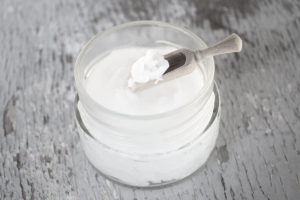
Oil pulling is a dental treatment practiced in the Indian medical tradition, Ayurveda.
In oil pulling, you place a suitable amount of oil—sesame, sunflower or coconut oil—in your mouth and slosh it around for 10-15 minutes.
Benefits include elimination of toxicity from the mouth, curing of tooth decay, tooth whitening, and prevention of cavities.
To increase the efficacy of oil pulling, we recommend that you add essential oils to your chosen oil.
Add 2-3 drops of cinnamon, spearmint or peppermint oil into a tablespoon of coconut oil for bad breath.
To alleviate toothache, add 2-3 drops of clove bud or tea tree essential oils, or use one drop of each.
Gum disease can be treated with 2-3 drops of cinnamon, clove bud or tea tree essential oils.
For receding gums, use 2-3 drops of Myrrh Essential Oil.
If you have canker sores, use 2-3 drops of Basil Essential Oil.
Make Your Own Toothpaste

For a basic toothpaste that will last a week, use the following ingredients:
6 tablespoons coconut oil
6 tablespoons bicarbonate of soda
10-15 drops of essential oils
This natural toothpaste recipe may work better than commercial toothpastes and with none of the toxic ingredients, such as fluoride or sodium lauryl sulfate.
The best essential oils to be used in a toothpaste are the ones with strong antibacterial and anti-inflammatory properties, such as clove bud, peppermint, tea tree, eucalyptus and lemon.
To add a little bit of grit into your toothpaste, and to help draw out impurities from the mouth, include a small amount of bentonite clay in your recipe. Remove an equal amount of bicarb soda to keep the consistency of your toothpaste comfortable.
For a whitening toothpaste, add a small amount of food grade hydrogen peroxide.
As with all toothpastes, do not swallow your homemade one, either.
1. Mercola J. 97% of Terminal Cancer Patients Previously Had Root Canal Procedure.
2. Alqareer A, Alyahya A, Andersson L. The effect of clove and benzocaine versus placebo as topical anesthetics. Journal of Dentistry. 2006.
3. Activity of peppermint oil to anaerobic bacteria. Dental and Medical Problems. 2010.
4. Veenu Madaan Hans, Harpreet Singh Grover, Himanshu Deswal, Preeti Agarwal. Antimicrobial efficacy of various essential oils at varying concentrations against periopathogen Porphyromonas gingivalis. Journal of Clinical and Diagnostic Research. 2016.
5. Shapiro S, Meier A, Guggenheim B. The antimicrobial activity of essential oils and essential oil components towards oral bacteria. Oral Microbiol Immunol. 1994.
